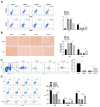Adenovirus-IL-10 relieves chronic rejection after mouse heart transplantation by inhibiting miR-155 and activating SOCS5
- PMID: 36794154
- PMCID: PMC9925994
- DOI: 10.7150/ijms.77093
Adenovirus-IL-10 relieves chronic rejection after mouse heart transplantation by inhibiting miR-155 and activating SOCS5
Abstract
Objective: Chronic rejection remains the main factor that influence long-term survival of patients after heart transplantation. Interleukin-10 (IL-10) play critical role in macrophages-mediated transplant immune responses. We investigated the mechanism of IL-10 in macrophage related chronic rejection after mouse heart transplantation. Methods: Mouse heart transplant chronic rejection model was established to evaluate pathological changes in the allograft. Myocardial interstitial fibrosis, apoptosis, and inflammatory factor levels were detected in ad-IL-10-treated mice. The positive iNOS+ and Arg-1+ expressions, macrophage subset changes, and the proportion of regulatory T-cells (Tregs) and TIGIT+ Tregs were quantified by flow. In in vitro experiments, ad-IL-10 was transfected into macrophages followed by detection of apoptosis, phagocytosis, and CD163, CD16/32, and CD206 expression. The expression and relationships between IL-10, miR-155, and SOCS5 were also detected and verified. A rescue experiment was performed to evaluate macrophage function through the combined treatment of ad-IL-10 and overexpression of miR-155. Results: Significantly decreased IL-10 expression in chronic rejection during mouse heart transplantation was observed. Ad-IL-10-treated mice showed decreased pathological injury, perivascular fibrosis, apoptosis, inflammation, and iNOS+ and CD16/32+ expression, and increased Treg/TIGIT+ Treg cell, Arg-1+ and CD206+ cell proportion. Ad-IL-10-treated macrophages in vitro showed reduced apoptosis, improved phagocytosis, and M2 polarization. Mechanically, IL-10 negatively regulated miR-155 to activate SOCS5. Overexpression of miR-155 reversed IL-10 mediated-positive regulation of macrophage function. Conclusion: IL-10 downregulated miR-155 and activated SOCS5, thereby promoting macrophage M2 polarization to relieve chronic rejection after heart transplantation.
Keywords: Chronic rejection after heart transplantation; IL-10; Macrophage; Macrophage function; SOCS5; microRNA-155.
© The author(s).
Conflict of interest statement
Competing Interests: The authors have declared that no competing interest exists.
Figures






Similar articles
-
Competitive binding of CD226/TIGIT with poliovirus receptor regulates macrophage polarization and is involved in vascularized skin graft rejection.Am J Transplant. 2023 Jul;23(7):920-934. doi: 10.1016/j.ajt.2023.04.007. Epub 2023 Apr 11. Am J Transplant. 2023. PMID: 37054890
-
ADAR1 attenuates allogeneic graft rejection by suppressing miR-21 biogenesis in macrophages and promoting M2 polarization.FASEB J. 2018 Sep;32(9):5162-5173. doi: 10.1096/fj.201701449R. Epub 2018 Apr 25. FASEB J. 2018. PMID: 29694248
-
Knockout of microRNA-155 ameliorates the Th1/Th17 immune response and tissue injury in chronic rejection.J Heart Lung Transplant. 2017 Feb;36(2):175-184. doi: 10.1016/j.healun.2016.04.018. Epub 2016 May 6. J Heart Lung Transplant. 2017. PMID: 27296836
-
Macrophage regulated cell death: implications and mechanisms in organ transplantation.Front Immunol. 2025 May 23;16:1604429. doi: 10.3389/fimmu.2025.1604429. eCollection 2025. Front Immunol. 2025. PMID: 40486507 Free PMC article. Review.
-
Macrophages in Transplantation: A Matter of Plasticity, Polarization, and Diversity.Transplantation. 2022 Feb 1;106(2):257-267. doi: 10.1097/TP.0000000000003804. Transplantation. 2022. PMID: 33908380 Free PMC article. Review.
Cited by
-
Posttransplant complications: molecular mechanisms and therapeutic interventions.MedComm (2020). 2024 Sep 2;5(9):e669. doi: 10.1002/mco2.669. eCollection 2024 Sep. MedComm (2020). 2024. PMID: 39224537 Free PMC article. Review.
-
Cardiovascular System is Influenced by Skeletal Muscle-derived Extracellular Vesicles, Myokines and MicroRNAs Based on Interorgan Communication: A Systematic Review.Int J Med Sci. 2025 Apr 28;22(10):2382-2397. doi: 10.7150/ijms.111775. eCollection 2025. Int J Med Sci. 2025. PMID: 40386050 Free PMC article.
-
Mechanism Exploration on the Immunoregulation of Allogeneic Heart Transplantation Rejection in Rats With Exosome miRNA and Proteins From Overexpressed IDO1 BMSCs.Cell Transplant. 2024 Jan-Dec;33:9636897241245796. doi: 10.1177/09636897241245796. Cell Transplant. 2024. PMID: 38629748 Free PMC article.
References
-
- Balam S, Schiechl-Brachner G, Buchtler S, Halbritter D, Schmidbauer K, Talke Y. et al. IL-3 Triggers Chronic Rejection of Cardiac Allografts by Activation of Infiltrating Basophils. Journal of immunology (Baltimore, Md: 1950) 2019;202:3514–23. - PubMed
-
- Liu X, Lu Y, Lian Y, Chen Z, Xia J, Meng L. et al. Macrophage Depletion Improves Chronic Rejection in Rats With Allograft Heart Transplantation. Transplantation proceedings. 2020;52:992–1000. - PubMed
-
- Rutz T, de Marchi SF, Roelli P, Gloekler S, Traupe T, Steck H. et al. Quantitative myocardial contrast echocardiography: a new method for the non-invasive detection of chronic heart transplant rejection. Eur Heart J Cardiovasc Imaging. 2013;14:1187–94. - PubMed
-
- Wong BW. Lymphatic vessels in solid organ transplantation and immunobiology. Am J Transplant. 2020;20:1992–2000. - PubMed
MeSH terms
Substances
LinkOut - more resources
Full Text Sources
Medical
Research Materials
Miscellaneous

